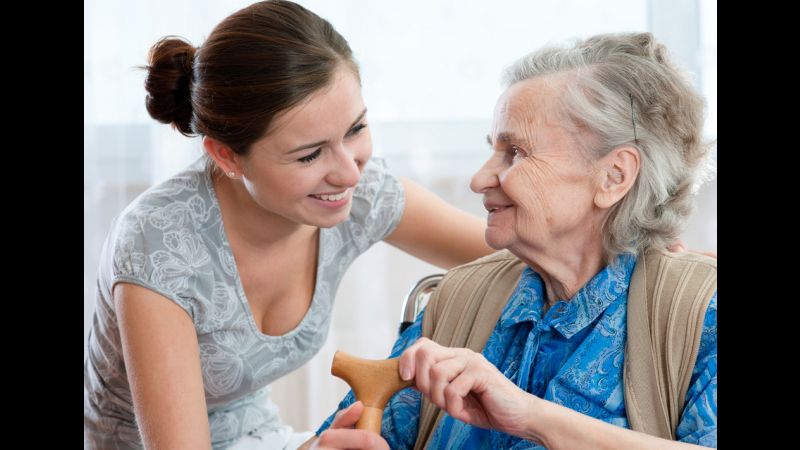We spoke with Sean Cook with Griswold Home Care to gather some tips if you're considering bringing in home caregiving services. It's not always easy allowing a stranger into your home, and Sean provides some excellent advice for what to look for in a service.
How an In-Home Caregiver Can Make Aging in Place Easier
According to a recent report by the American Association for Retired Persons (AARP), most older adults in need of extra care would prefer to receive care in their own home instead of an assisted living facility. This trend, known as aging in place, has a positive impact on the mental well-being of seniors by giving them a sense of comfort and familiarity in their surroundings. Aging in place also endows them with a stronger sense of independence; the ability to come and go as they please, so long as they are capable of doing so, is highly valuable for their confidence and general wellness.
However, some older adults do need additional care. Their grown children may be juggling a career and family of their own, which makes it difficult for them to look in on Mom and Dad as often as they would like.
In-home care offers a plausible solution to allowing older loved ones to age in place while simultaneously providing an added “support team” to the family of these seniors. This gives family members added peace of mind. They can feel confident their loved one is receiving the care they need, even when they can’t be physically present to care for them themselves.
What Types of Services Are Offered by In-Home Caregivers
There are a number of agencies around the country that refer in-home caregivers to the families of older adults. While some older adults may have a need for more intensive care, a great many seniors benefit from non-medical in-home care. Caregivers can help enrich the lives of those in their charge in myriad ways. From reminding them to take medication to assisting with running errands, a caregiver’s duties vary depending upon the senior in their care. Some of the services covered under the banner of non-medical in-home care include:
- Personal care – Some older adults may need help with personal hygiene and grooming. Conditions such as arthritis may make it difficult for them to get dressed, tend to their personal hygiene, or brush their hair. Additionally, since many in-home caregivers have their own transportation, they can assist seniors who are no longer able to drive with running errands or transporting them to appointments and activities. An in-home caregiver can help with these small, but important functions.
- Housekeeping – Referred caregivers can also tidy up an older adult’s home. This not only keeps a senior’s surroundings neat, clean, and feeling like home, but also eases the burden on the family members caring for them. Homemaking services allow family members, who may already have too much on their plate, to spend more quality time with their loved one rather than tending to their home.
- Companionship – Another key area where an in-home caregiver can be of value to a senior is by offering them companionship. An article published in the Harvard Women’s Health Watch noted that individuals who do not have a regular, quality social interaction increase their risk of premature death by 50%. Older adults who may have lost friends and family members in their own age group to disease, death, or relocation may still want to interact with others. If an older adult is infirm or has problems getting around, having an in-home caregiver to serve as a companion to provide them with conversation, mental stimulation, and the means to get out of the house for a pleasant change of scenery can be beneficial to both that person and their family.
- Live-In Care – It’s not unheard of for the adult children of older parents to have schedules that extend long after their 9-to-5 work days. Having a live-in or overnight caregiver may help to reduce a senior’s risk of being admitted to a full-time nursing facility. Live-in care or overnight care can be beneficial to older adults, who may need more help when their families are away. In these scenarios, caregivers that are referred make arrangements with the family of the senior in their care. In all cases, a live in caregiver would need to have a spare bedroom. However, details surrounding meals, the extent of their duties and care, as well as other items that vary on a case-by-case, family-by-family basis are sometimes agreed upon by both the family and the caregiver.
Non-medical in-home care can be a terrific way for older adults and their families to receive the added care they need to enhance their quality of life for years to come. For even more peace of mind, a Medical Guardian medical alert device is the perfect way to ensure an aging loved one's safety at home, 24/7. Whether they experience a fall or medical emergency and require EMTs, or if they simply need a friend of neighbor, help is always just the push of a button away. Plus, your family can rest assured knowing that they will be instantly notified by our top-rated monitoring center should your loved one ever need to use their system to call for help.
Sean Cook is a Marketing Account Specialist at Griswold Home Care. Griswold currently has 259 locations nationwide and counting!

